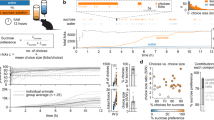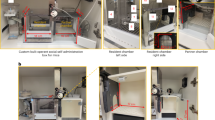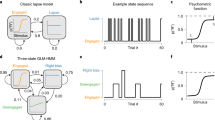Abstract
BEHAVIOURAL geneticists have criticized mathematical models of learning and choice which do not consider genetic and other individual difference parameters1,2. No one, however, has demonstrated empirically that genetically related variables aid in determining how well a given model will fit the data. I have found it necessary to include familial parameters within the framework of probabilistic models.
This is a preview of subscription content, access via your institution
Access options
Subscribe to this journal
Receive 51 print issues and online access
$199.00 per year
only $3.90 per issue
Buy this article
- Purchase on Springer Link
- Instant access to full article PDF
Prices may be subject to local taxes which are calculated during checkout
Similar content being viewed by others
References
Hirsch, J., in Roots of Behavior (edit. by Bliss, E.) (Harper and Brothers, New York, 1962).
Hirsch, J., Science, 142, 1436 (1963).
Luce, R. D., Individual Choice Behavior: a Theoretical Analysis (John Wiley and Sons, New York, 1959).
Author information
Authors and Affiliations
Rights and permissions
About this article
Cite this article
LEVINE, R. Genetic Relationships, Choice Models, and Sucrose Preference Behaviour in Mice. Nature 215, 668–669 (1967). https://doi.org/10.1038/215668b0
Received:
Issue Date:
DOI: https://doi.org/10.1038/215668b0
This article is cited by
-
Nafamostat reduces systemic inflammation in TLR7-mediated virus-like illness
Journal of Neuroinflammation (2022)
-
Chronic mild stress paradigm as a rat model of depression: facts, artifacts, and future perspectives
Psychopharmacology (2022)
Comments
By submitting a comment you agree to abide by our Terms and Community Guidelines. If you find something abusive or that does not comply with our terms or guidelines please flag it as inappropriate.



